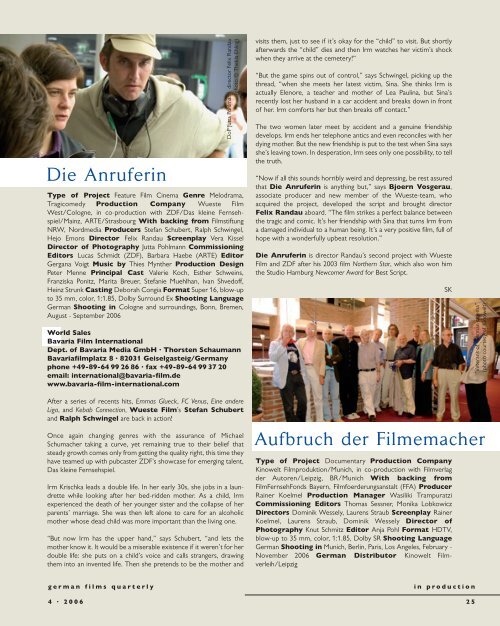Quarterly 4 · 2006 - German Cinema
Quarterly 4 · 2006 - German Cinema
Quarterly 4 · 2006 - German Cinema
You also want an ePaper? Increase the reach of your titles
YUMPU automatically turns print PDFs into web optimized ePapers that Google loves.
Die Anruferin<br />
DoP Jutta Pohlmann, director Felix Randau<br />
(photo © Thekla Ehling)<br />
Type of Project Feature Film <strong>Cinema</strong> Genre Melodrama,<br />
Tragicomedy Production Company Wueste Film<br />
West/Cologne, in co-production with ZDF/Das kleine Fernsehspiel/Mainz,<br />
ARTE/Strasbourg With backing from Filmstiftung<br />
NRW, Nordmedia Producers Stefan Schubert, Ralph Schwingel,<br />
Hejo Emons Director Felix Randau Screenplay Vera Kissel<br />
Director of Photography Jutta Pohlmann Commissioning<br />
Editors Lucas Schmidt (ZDF), Barbara Haebe (ARTE) Editor<br />
Gergana Voigt Music by Thies Mynther Production Design<br />
Peter Menne Principal Cast Valerie Koch, Esther Schweins,<br />
Franziska Ponitz, Marita Breuer, Stefanie Muehlhan, Ivan Shvedoff,<br />
Heinz Strunk Casting Deborah Congia Format Super 16, blow-up<br />
to 35 mm, color, 1:1.85, Dolby Surround Ex Shooting Language<br />
<strong>German</strong> Shooting in Cologne and surroundings, Bonn, Bremen,<br />
August - September <strong>2006</strong><br />
World Sales<br />
Bavaria Film International<br />
Dept. of Bavaria Media GmbH <strong>·</strong> Thorsten Schaumann<br />
Bavariafilmplatz 8 <strong>·</strong> 82031 Geiselgasteig/<strong>German</strong>y<br />
phone +49-89-64 99 26 86 <strong>·</strong> fax +49-89-64 99 37 20<br />
email: international@bavaria-film.de<br />
www.bavaria-film-international.com<br />
After a series of recents hits, Emmas Glueck, FC Venus, Eine andere<br />
Liga, and Kebab Connection, Wueste Film’s Stefan Schubert<br />
and Ralph Schwingel are back in action!<br />
Once again changing genres with the assurance of Michael<br />
Schumacher taking a curve, yet remaining true to their belief that<br />
steady growth comes only from getting the quality right, this time they<br />
have teamed up with pubcaster ZDF’s showcase for emerging talent,<br />
Das kleine Fernsehspiel.<br />
Irm Krischka leads a double life. In her early 30s, she jobs in a laundrette<br />
while looking after her bed-ridden mother. As a child, Irm<br />
experienced the death of her younger sister and the collapse of her<br />
parents’ marriage. She was then left alone to care for an alcoholic<br />
mother whose dead child was more important than the living one.<br />
“But now Irm has the upper hand,” says Schubert, “and lets the<br />
mother know it. It would be a miserable existence if it weren’t for her<br />
double life: she puts on a child’s voice and calls strangers, drawing<br />
them into an invented life. Then she pretends to be the mother and<br />
visits them, just to see if it’s okay for the “child” to visit. But shortly<br />
afterwards the “child” dies and then Irm watches her victim’s shock<br />
when they arrive at the cemetery!“<br />
“But the game spins out of control,” says Schwingel, picking up the<br />
thread, “when she meets her latest victim, Sina. She thinks Irm is<br />
actually Elenore, a teacher and mother of Lea Paulina, but Sina’s<br />
recently lost her husband in a car accident and breaks down in front<br />
of her. Irm comforts her but then breaks off contact.”<br />
The two women later meet by accident and a genuine friendship<br />
develops. Irm ends her telephone antics and even reconciles with her<br />
dying mother. But the new friendship is put to the test when Sina says<br />
she’s leaving town. In desperation, Irm sees only one possibility, to tell<br />
the truth.<br />
“Now if all this sounds horribly weird and depressing, be rest assured<br />
that Die Anruferin is anything but,” says Bjoern Vosgerau,<br />
associate producer and new member of the Wueste-team, who<br />
acquired the project, developed the script and brought director<br />
Felix Randau aboard. “The film strikes a perfect balance between<br />
the tragic and comic. It’s her friendship with Sina that turns Irm from<br />
a damaged individual to a human being. It’s a very positive film, full of<br />
hope with a wonderfully upbeat resolution.”<br />
Die Anruferin is director Randau’s second project with Wueste<br />
Film and ZDF after his 2003 film Northern Star, which also won him<br />
the Studio Hamburg Newcomer Award for Best Script.<br />
Aufbruch der Filmemacher<br />
Type of Project Documentary Production Company<br />
Kinowelt Filmproduktion/Munich, in co-production with Filmverlag<br />
der Autoren/Leipzig, BR/Munich With backing from<br />
FilmFernsehFonds Bayern, Filmfoerderungsanstalt (FFA) Producer<br />
Rainer Koelmel Production Manager Wasiliki Trampuratzi<br />
Commissioning Editors Thomas Sessner, Monika Lobkowicz<br />
Directors Dominik Wessely, Laurens Straub Screenplay Rainer<br />
Koelmel, Laurens Straub, Dominik Wessely Director of<br />
Photography Knut Schmitz Editor Anja Pohl Format HDTV,<br />
blow-up to 35 mm, color, 1:1.85, Dolby SR Shooting Language<br />
<strong>German</strong> Shooting in Munich, Berlin, Paris, Los Angeles, February -<br />
November <strong>2006</strong> <strong>German</strong> Distributor Kinowelt Filmverleih/Leipzig<br />
german films quarterly in production<br />
4 <strong>·</strong> <strong>2006</strong> 25<br />
SK<br />
“Veterans of <strong>German</strong> cinema”<br />
(photo courtesy of Kinowelt)
















